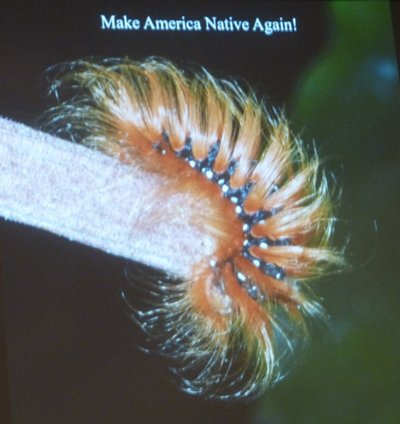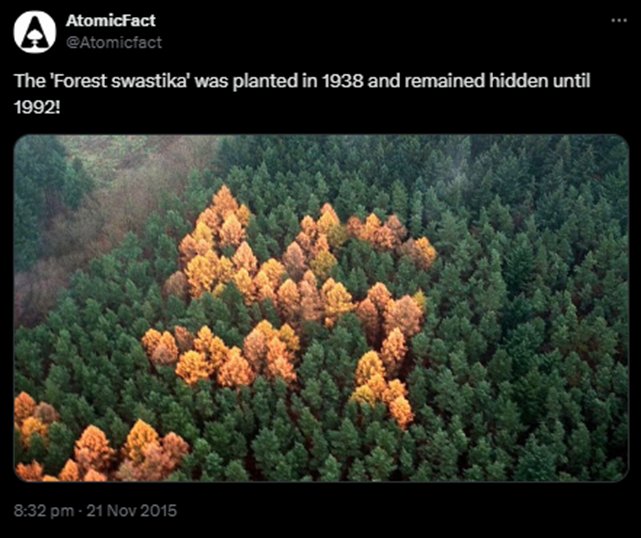What is it about BBC employees and the needless politicisation of gardening? Evidently not having read my piece on this website last week about this very topic, Kate Bradbury, the Wildlife Editor of BBC Gardeners’ World Magazine, went on-stage at the Cheltenham Science Festival on Sunday to claim there was some kind of innate divide between the sexes when it came to the topic of mowing one’s lawn, with attitudes towards such things apparently being “quite gendered”.
Who is Kate Bradbury? I think the following recent tweet of hers (complete with obligatory Pride Month Rainbow Flag) sums up the answer perfectly:

It seems the reason most of these lovely creatures like bees and toads are now beginning to “disappear” is because, under the toxic influence of the patriarchy, British householders are all mowing our lawns way too low for them to hide out and live in (even though bees live in hives and toads frequent ponds, not long grasses – still, as Kate says, “I’m not a scientist”).
Whilst promoting her deeply right-on-sounding new book One Garden Against the World: In Search of Hope in a Changing Climate, Bradbury professed herself to be of the opinion that women are more likely to value deliberately uncut long grass in a garden as resembling a “lovely” meadow, whilst men are more prone to just frown and ask “why are you watering those weeds?” Also proving that many females these days have little regard for law’n order was Rachel de Thame, a regular presenter on the BBC’s actual Gardeners’ World TV show, who told the Cheltenham crowd her daughter thought the family’s uncut lawn, filled with wildflowers/weeds (delete according to genitalia) was “beautiful”, whereas her husband thought it was just “messy”.
Men, like the hideous SS-style control-freaks they are, were more likely to prefer “order” in their gardens, the prize pair agreed, echoing earlier 2021 comments of another (male, but probably currently transitioning) Gardener’s World presenter, Monty Don, that cutting your lawn was a masculine “obsession” which was all about “control”. “Making a lawn that is pure grass without any filthy and foreign invading plants in there, making sure it’s stripy and neat” was an innately male obsession of “controlling rather than embracing”, explained the distinctly Pythonesque-sounding Monty, as if using a Flymo was akin to battering a helpless wife. Another BBC presenter, Chris Packham, has also described lawnmowing as “a very bizarre habit”; fair enough, my lawn would describe him as “a very bizarre man”.
Lawns With No Borders
What is wrong with those who run the West today? Can there ever have been a society as relentlessly obsessed with pointlessly politicising absolutely every single thing (quite literally) under the sun, even harmless lawns, flowers and gardens? Well, yes actually – Nazi Germany, as it happens. Or, at least, this is the claim of certain Left-wingers and eco-nuts these days.
As I discussed last week, certain horticulturalists out there seem preoccupied with asserting that those who insist upon planting native species of flowers, trees and shrubs in their gardens are some kind of secret crypto-fascists, obsessed with maintaining the purity of their own racial homeland, as well as that of their flowerbeds – ‘Blood and Soil’, as the Nazis used to say. An excellent example grew out of the annual conference of the California Native Plant Society in 2018, which concluded with the following photo of a breed of orange American caterpillar which happened to bear a remarkable resemblance to an equally orange breed of American President, Donald Trump:

“Make America Native Again!” blared the caption, as if to decry all who agreed with such sentiments as being big white racists (although in fact the lecturer who showed it was himself a native-plant advocate, and just intended it as a joke). Rather than merely inducing laughter, as would be the case amongst most normal people, however, this photograph instead prompted some very deep thoughts upon behalf of users of the U.S.-based Million Trees eco-website, which is devoted towards repudiating nativist narratives of the plant-world. As Million Trees explained:
This photo generated some discussion among the readers of Million Trees about nativism in the natural world. Is it related to nativism in the human realm? This is a timely question because American politics are presently consumed by anti-immigration sentiment, AKA ‘nativism’. As members of our communities [i.e., illegal Mexican immigrants] are unceremoniously rounded up in immigration raids and deported from America, this is an association that is getting more attention.
Accordingly, Million Trees commissioned Professor Art Shapiro, “a renowned expert on the butterflies of California”, to discuss the alleged rise of the phrase “native-plant Nazis” to describe those who like to plant American plants in America, French plants in France, and so forth – with particular reference to the idea of planting German plants in Germany. Was this practice really what led to the eventual ultimate rise of the Third Reich?
The German Romantic movement of the 1700s and 1800s did help foster a certain form of nationalism which some may argue prefigured Nazism, and Professor Shapiro pointed out how such Teutonic Romantics as Goethe, Wagner, Novalis, Caspar David Friedrich et al. stressed the ‘organic unity’ between the German Volk and their landscape. Apparently, this even became reflected in Romantic-era gardening books, which advocated planting “patriotic species” to create corresponding landscapes of “patriotic character”. Was it sick advice like that which ultimately led to the Nazi-era planting of landscapes like these?

Heinrich Strimmler
It seems that, as the German Völkisch (roughly, ‘Folk-ish’) movement of back-to-Nature and respect for an imaginary heroic native Aryan past grew during the early decades of the 20th century, so did the idea of Völkisch gardening. Anticipating the rise of the mad Austrian pseudoscientist Hanns Hörbiger’s Welteislehre, or World-Ice Theory (a sort of Nazi climate-change cult in reverse; see my previous Daily Sceptic article on it here), it was argued by writers, ideologues and naturalists alike that it was during the last Ice Age that the supposedly characteristic qualities of the German Volk were formed – qualities like hardiness, discipline, strength and coolness of character, all of which were necessary to survive the pitiless Pleistocene frosts. However, as Germany’s plants also evolved into their current form during the last Ice Age, they also should have shared these same qualities, making people and plants natural kin, it was spuriously asserted.
Consequently, Völkisch writers provided curious gardening advice along the lines not only of filling your rockeries with nice local alpine species, but also of recreating the presumed ancient natural homes of Teutons amongst clearings within the dark Germanic forests: translated, this meant rejecting the formal, neat, symmetrical-type designs of classic English and French gardens, and letting things grow a bit more wildly, like the grasses in the gardens of those who now work for the BBC.
Once the Nazis came to power, they appointed an official Reichslandschaftsanwalt, or ‘National Landscape Advocate’, the horticulturalist Alwin Seifert, who deemed which plants were and were not racially acceptable to be allowed to take root in the sacred soil of the Reich. Surprisingly, these did actually include some foreign, non-native species, deemed ‘racially acceptable’, in the same rough manner Austrians, Anglo-Saxons and Scandinavians were in human terms.
SS chief Heinrich Himmler sponsored bizarre expeditions into the Tibetan Himalayas by his special paramilitary pseudo-archaeology unit the Ahnenerbe in search of plants growing strong amidst the Himalayan snows in conditions deemed similar to those his ancestors had once likewise grown strong in, back during the European Ice Age. Replanted in Germany, these ancient Welteislehre survivals could help restore the old Aryan Eden in German gardens of the 1930s.
Thus, concludes Professor Shapiro, as occasional importers of Tibetan plants from Asia, ironically enough, the Nazis “were never thoroughgoing ‘native-plant Nazis’” themselves at all, unlike some of their contemporary hardline U.S. and European counterparts these days. “Various observers have noted similarities in the rhetoric used by native-plant activists [in the West today] and that used by xenophobes,” observes Shapiro. Does that mean that those who want to plant an English rose in England c.2024 are actually even worse than the Nazis once were? Professor Shapiro (whose article is actually fairly measured, informative and reasonable) doesn’t say so – but certain others have come very close.
Pollan Sniffs At Pollen
An article often-cited by advocates of a non-nativist, wholly borderless plant-world utopia these days is ‘Against Nativism’, by food and plants writer Michael Pollan, which first appeared in the New York Times Magazine in 1994. Here, making reference to the then-leading nativist plant-advocate Ken Druse, Pollan warned darkly that:
Intolerance toward foreign species seems to be rising in the natural-gardening movement, if the progress of Druse’s own thinking is any indication. His first book allowed that “naturalised aliens” (he mentions daisies) “are welcome in the natural garden”. Five years later, he wants to close the border, because “even a short visit by a non-native can upset the balance of the community enough to cause extirpation or even extinction of a native plant”. He offers no scientific proof for this contention, leaving the reader to wonder if the darkening spectre of alien species in the garden might have less to do with ecology than ideology.
Was Ken Druse an undercover Nazi, then? In my own opinion, the one who is actually more ideologically motivated in his position regarding non-native plant-species here is Pollan, not Druse. He continues:
Am I implying that natural gardening in America is a crypto-Fascist movement? I hope not … [However] The German [i.e., Nazi] example also suggests we would do well to beware of ideology in the garden masquerading as science. It’s hard to believe that there is nothing more than scientific concern about invasive species behind the current fashion for natural gardening and native plants in America — not when our national politics are rife with anxieties about immigration and isolationist sentiment. The garden isn’t the only corner of American culture where nativism is in flower just now.
Pollan concluded his piece thus:
But if we must have a national garden style, there’s no reason it has to be xenophobic, or founded on illusions of a lost American Eden. Wouldn’t a more cosmopolitan garden, one that borrowed freely from all the world’s styles and floras, that made something of history rather than trying to escape it — wouldn’t such a garden be more in keeping with the American experience? … Here’s to multihorticulturalism.
So we have multihorticulturalism now, too, do we, to go along with plain old Left-mandated human multiculturalism? As I say, this particular article did appear in the New York Times…
Soiling Themselves and Wetting Their Plants
An interesting 2003 academic paper on this whole subject, ‘The Native Plant Enthusiasm: Ecological Panacea or Xenophobia?’, by a pair of (non-Nazi) German academics, explains how, from the early 1900s onwards, a laughable-sounding new ‘academic’ discipline called ‘plant sociology’ was born, which is now generally derided as a pseudo-scientific expression of evil white supremacist ideologies and thought-patterns of the day. One 1928 book was called Plant Sociology: The Study of Plant Communities, and it seems the term ‘communities’ here was not to be taken entirely metaphorically.
Not all ‘plant sociologists’ were German Nazis. One prominent such odd-bod was Jens Jensen, an American landscape architect, who, according to the paper, “believed that plants communicate and associate like humans”. In a 1923 article in a German gardening periodical, Jensen implausibly claimed of native plants that “it was them amongst whom we grew up… they taught us a particular language without interruption since the earliest days of our tribe… they are interwoven with the soul of our race” and so no garden “will be able to reflect the soul of a tribal people” if it does not contain only those very same ancient domestic plants with whom their ancestors grew up and communed. Distinct echoes of King Charles chatting to his daffodils.
Non-native plants, meanwhile, were, Jensen warned, “Strange things… grotesque things… Freaks are freaks, and often bastards – who wants a bastard in the garden, the out-of-door shrine of your home?” He sounds like he may well have been quite a bastard in the garden himself, to me – and probably indoors or in his potting-shed too. Despite being the self-appointed Flower-Führer of the USA, by the way, Jensen himself was actually born and raised in Denmark.
Clearly, people like Jensen were gigantic horticultural lunatics. Yet, in expressing their profound desire for total nonsenses like ‘multihorticulturalism’, aren’t the woke gardeners of today, whether working for the BBC or NYT, equally as lunatic themselves, just from a directly opposing political perspective, of extreme Left rather than extreme Right? Some of these people can often seem just as vehemently anti-white as the likes of Jensen were once vehemently pro-white. I repeat a tweet here from my previous ‘racist gardening’ article from another leading BBC gardener, James Wong:

That’s just Jens Jensen upside-down, isn’t it? The whole Nazi-era non-subject of ‘plant sociology’ (in the sense I’m talking about it above – there is a legitimate, wholly non-political, discipline of this same name) is not dead after all, as many may have naturally presumed – it has just mutated into its own inverted mirror-form anew.
When I see a plant, or a lawn, or a tree, I just see a plant, a lawn, or a tree. When people like Jensen, Wong or Pollan see them, they seem instead somehow to see entire ideologies, in coded green-leafed form. Political extremisms of the past are being reborn anew en masse, just relabelled as being ‘progressive’, when in actual fact they are anything but. BBC Gardeners’ World Magazine is not the only aspect of our rapidly rotting society in dire need of urgent root and branch reform, I fear.
Steven Tucker is a journalist and the author of over 10 books, the latest being Hitler’s & Stalin’s Misuse of Science: When Science Fiction Was Turned Into Science Fact by the Nazis and the Soviets (Pen & Sword/Frontline), which is out now.














To join in with the discussion please make a donation to The Daily Sceptic.
Profanity and abuse will be removed and may lead to a permanent ban.